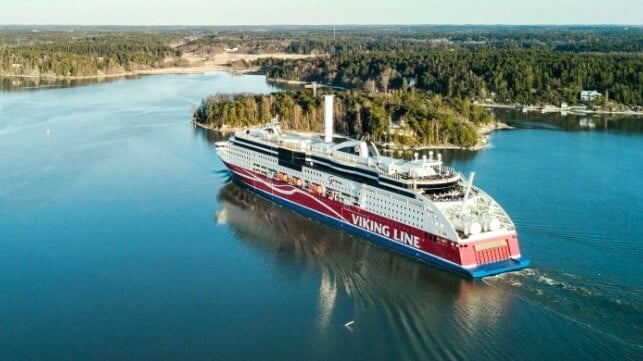Viking Line Sees Improved Supplies of Bio-LNG on the Market

Finnish ro/pax operator Viking Line began offering passengers the opportunity to pay for bio-LNG on its voyages last year, and the possibilities for using this sustainable fuel have been growing, the company reported last week.
"We made sure that Viking Glory, which was completed in 2021, and Viking Grace, which was completed in 2013, were built with the technological readiness to use biogas and synthetic fuels produced from renewable energy," said Viking Line’s Sustainability Manager, Dani Lindberg. "There is now enough biogas being produced in the market so that we can start to use this fuel together with liquefied natural gas for these two climate-smart vessels."
Under Viking's low-carbon pricing program, passengers on the Turku route are offered the option of buying biofuel to cover their journey. This adds a manageable fee of up to €5 in addition to the fare, which ranges between €45-55. The price is based on the typical fuel usage per passenger, and effectively reduces the passenger’s carbon footprint by up to 90 percent. The two passenger ferries make two sailings each day on the same route, and the voyage takes eight to 12 hours depending on the vessel.
Last year, Lindberg said that the local supply of bio-LNG was limited, constraining the amount that Viking could access. Subsidies may be required to expand production, according to the International Council on Clean Transportion (ICCT); with the right policies, 98 billion cubic meters (bcm) of biomethane could be produced in Europe by 2050, according to an industry-backed study for Gas for Climate. This would be enough to replace about 30 percent of current European demand for pipeline gas.

that matters most
Get the latest maritime news delivered to your inbox daily.
Viking also uses electricity from renewable energy at all of the ports where it uses shore power, which reduces the company’s annual greenhouse gas emissions by about 780 tonnes. Last year it also sold its largest and most emissions-intensive vessel, the M/S Rosella.
For the second time, Viking Line was named the most sustainable company in maritime transport service between Finland and Sweden last year, based on a passenger survey.
